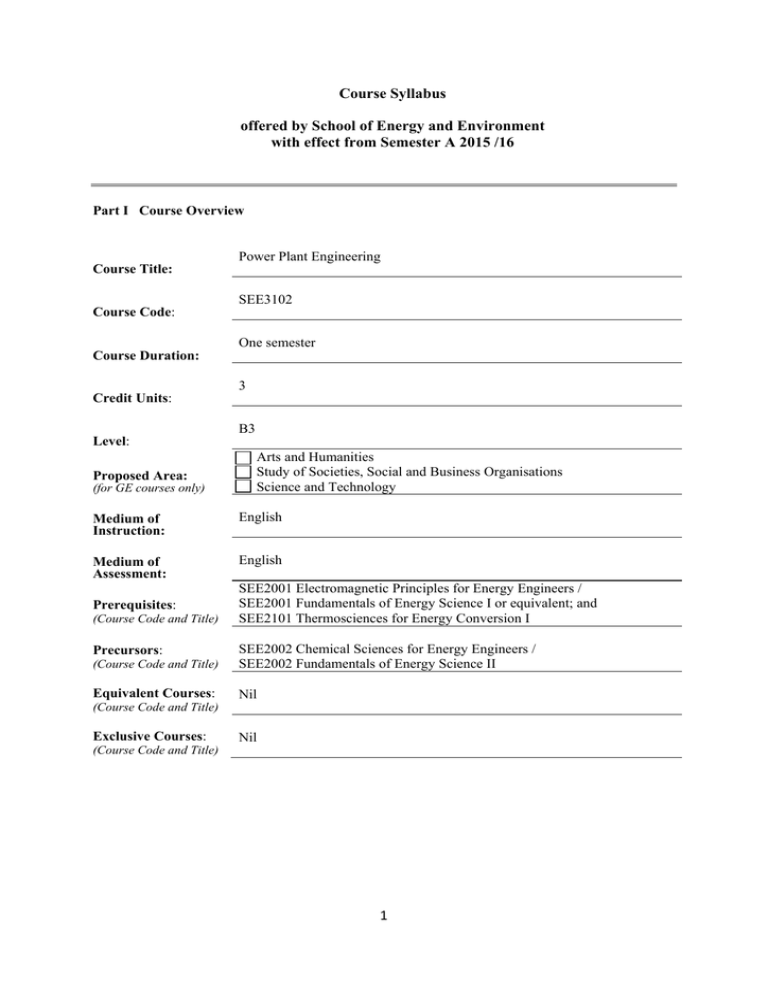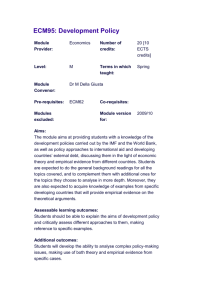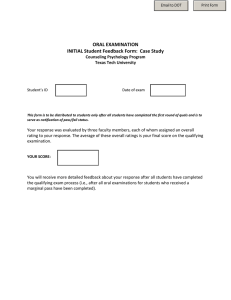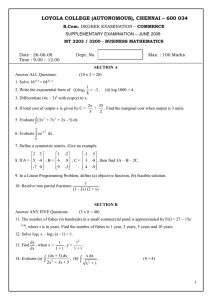SEE3102
advertisement

Course Syllabus offered by School of Energy and Environment with effect from Semester A 2015 /16 Part I Course Overview Power Plant Engineering Course Title: SEE3102 Course Code: One semester Course Duration: 3 Credit Units: B3 Level: Proposed Area: (for GE courses only) Arts and Humanities Study of Societies, Social and Business Organisations Science and Technology Medium of Instruction: English Medium of Assessment: English Prerequisites: (Course Code and Title) SEE2001 Electromagnetic Principles for Energy Engineers / SEE2001 Fundamentals of Energy Science I or equivalent; and SEE2101 Thermosciences for Energy Conversion I (Course Code and Title) SEE2002 Chemical Sciences for Energy Engineers / SEE2002 Fundamentals of Energy Science II Equivalent Courses: Nil Precursors: (Course Code and Title) Exclusive Courses: Nil (Course Code and Title) 1 Part II Course Details 1. Abstract (A 150-word description about the course) This course introduces the general knowledge and engineering principles of conventional power plants. The course will emphasise on energy resources such as fossil fuels, nuclear and hydroelectric. Electric generators, corresponding devices and technologies for power generation, distribution and transmission will be discussed. 2. Course Intended Learning Outcomes (CILOs) (CILOs state what the student is expected to be able to do at the end of the course according to a given standard of performance.) No. CILOs# Weighting* (if applicable) 1. Calculate energy output and gas emission from various fuel sources Describe the principles of heat engines and analyse energy conversion efficiency Describe the mechanisms of various power plant systems. Describe the principles of power generators Analyze power transmission and distribution systems 20 30 10 20 20 2. 3. 4. 5. Discoveryenriched curriculum related learning outcomes (please tick where appropriate) A1 A2 A3 * If weighting is assigned to CILOs, they should add up to 100%. 100% # Please specify the alignment of CILOs to the Gateway Education Programme Intended Learning outcomes (PILOs) in Section A of Annex. A1: A2: A3: Attitude Develop an attitude of discovery/innovation/creativity, as demonstrated by students possessing a strong sense of curiosity, asking questions actively, challenging assumptions or engaging in inquiry together with teachers. Ability Develop the ability/skill needed to discover/innovate/create, as demonstrated by students possessing critical thinking skills to assess ideas, acquiring research skills, synthesizing knowledge across disciplines or applying academic knowledge to self-life problems. Accomplishments Demonstrate accomplishment of discovery/innovation/creativity through producing /constructing creative works/new artefacts, effective solutions to real-life problems or new processes. 2 3. Teaching and Learning Activities (TLAs) (TLAs designed to facilitate students’ achievement of the CILOs.) TLA Lecture Tutorial, class demo Brief Description Explain key concepts, such as theories related to electricity generation and distribution Solidify students’ concepts with practice CILO No. 1 2 3 4 5 Hours/week (if applicable) 2.5 hrs/wk 0.5 hr/wk 4. Assessment Tasks/Activities (ATs) (ATs are designed to assess how well the students achieve the CILOs.) Assessment Tasks/Activities Continuous Assessment: 60% In-class test Assignment CILO No. 1 2 3 4 5 Weighting * 40% 20% Remarks Examination: 40% (duration: 2 hours , if applicable) * The weightings should add up to 100%. 100% Examination duration: 2 hrs Percentage of coursework, examination, etc.: 60% by coursework; 40% by exam To pass a course, a student must do ALL of the following: 1) obtain at least 30% of the total marks allocated towards coursework (combination of assignments, pop quizzes, term paper, lab reports and/ or quiz, if applicable); 2) obtain at least 30% of the total marks allocated towards final examination (if applicable); and 3) meet the criteria listed in the section on Grading of Student Achievement. 3 5. Assessment Rubrics (Grading of student achievements is based on student performance in assessment tasks/activities with the following rubrics.) Assessment Task Criterion 1. In-class test Ability to analyse and solve practical problems related to energy supply and power plant Ability to evaluate and analyse questions related to electricity generation and distribution Ability to analyse and solve practical problems related to electricity generation and distribution 2. Assignment 3. Final exam Excellent (A+, A, A-) High Good (B+, B, B-) Significant Adequate (C+, C, C-) Moderate Marginal (D) Basic Failure (F) Not even reaching marginal levels High Significant Moderate Basic Not even reaching marginal levels High Significant Moderate Basic Not even reaching marginal levels 4 Part III Other Information (more details can be provided separately in the teaching plan) 1. Keyword Syllabus (An indication of the key topics of the course.) - - Fossil fuel based energy: - Coal; Fuel gas; Oil - Combustion, air-fuel ratio - Heat engine, Steam generators; Steam turbines; Gas turbines, power plant - Pollution and control Nuclear power: - Nuclear reactor; Uranium; Fission; Nuclear waste management Hydro-electric power plant Power generation and electric generators Power transmission and distribution - Switches, cables, fuses, transformers, converters - 3 phase, power factor, harmonics - High voltage DC - Smart metering - Power grid 2. Reading List 2.1 Compulsory Readings (Compulsory readings can include books, book chapters, or journal/magazine articles. There are also collections of e-books, e-journals available from the CityU Library.) 1. 2.2 D. Buchla, T. Kissell, T. Floyd, Renewable Energy Systems, Pearson, 2015 Additional Readings (Additional references for students to learn to expand their knowledge about the subject.) 1. 2. 3. 4. 5. 6. F.M. Vanek and L.D. Albright, Energy Systems Engineering – Evaluation & Implementation, McGraw-Hill, second edition, 2012. A.W. Culp, Principles of Energy Conversion, McGraw-Hill, 1991. A.K. Raja, A. P. Srivastava, M. Dwivedi, Power Plant Engineering, New Age International (P) Ltd., 2006. P.K. Nag, Power Plant Engineering, McGraw-Hill, 2001. C. King, Thermal Power Plant Cooling Context and Engineering of, ASME, 2014. J.R. Lamarsh and A.J. Baratta, Introduction to Nuclear Engineering, 3rd Ed., Prentice Hall, 2001. 5


